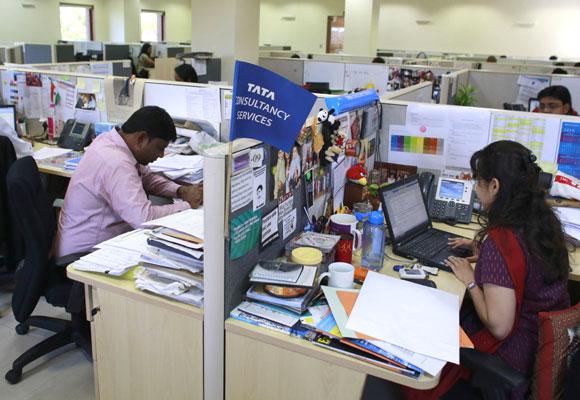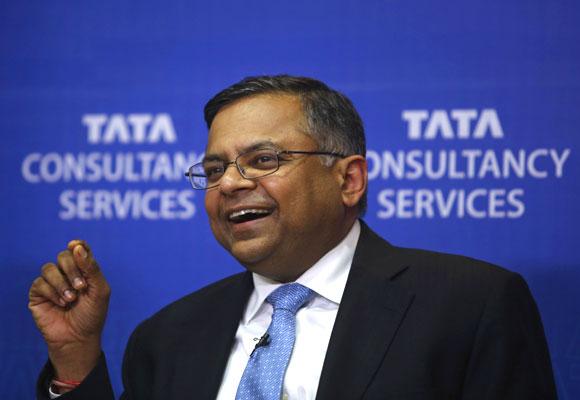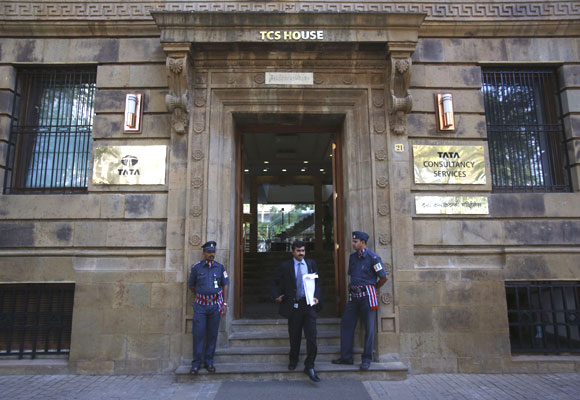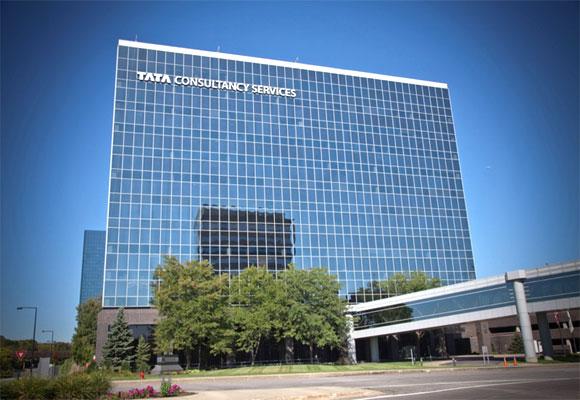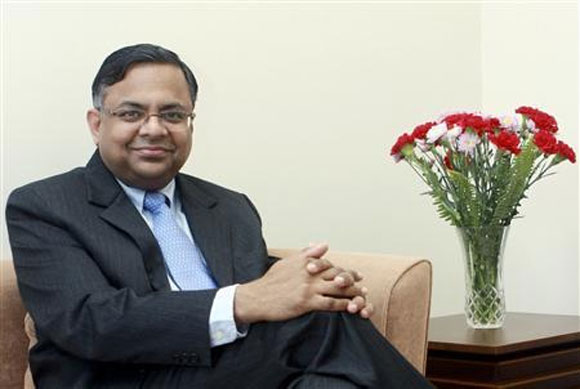 | « Back to article | Print this article |
What makes TCS tick?
The company is racing ahead of its peers even as other sectoral players feel the slowdown heat.
In 2008-09, Tata Consultancy Services (TCS) saw an impressive 23 per cent growth in its topline. But Infosys, which was trending higher than TCS in valuation, beat TCS with a 30 per cent growth. Five years later, the two companies present a stark contrast. Infosys' growth story is crumbling like a pack of cards, while TCS has not only managed to hold its ground but also race ahead of its peers on various fronts.
Over the past two years, TCS has managed to clock upwards of 27 per cent topline growth, while its profits have increased to 31 per cent in FY13 from 22 per cent in FY12.
These rapid strides to the top of the industry's pecking order are hardly surprising. Call it foresight or luck, but TCS began putting strategies and businesses in place to diversify its portfolio long before the global recession set in. Some of those strategies have come in handy in recent years.
For instance, towards the end of 2008, the company decided to restructure itself into smaller units. Accordingly, 23 business units were created - each with its own CEO, business goals, profit & loss and HR department. Only eight senior executives were to report to the CEO directly. What this revamp has done is to allow TCS to remain agile, make quick decisions and move forward with a clear strategic direction.
"There is no doubt that among its peers, TCS's presence in terms of service lines, portfolio of customers or geographical presence is much better," says a senior analyst of a leading MNC brokerage house. "Along with that, it pursued growth, wherever that came from - unlike its peers who were looking for higher-margin business. But, more importantly, what has worked for TCS is its consistent leadership."
Click on NEXT for more...
What makes TCS tick?
Winning plan
CEO and managing director N Chandrasekaran makes no bones about the company's winning plan. "We have a good strategy that has been clearly articulated, and is being carried forward and implemented. We have a full services portfolio operating across the entire value chain, with a diversified presence.
All these past quarters, we have had broad-based growth. When you have such a growth engine, any sudden negative surprise can be managed well," he says.
TCS found itself on stronger ground because many of its peers have heavy dependence or exposure to certain verticals and service lines. For instance, what has impacted Infosys the maximum is its higher exposure to discretionary spending.
The company's exposure to this segment is over 30 per cent. Add to this its biggest vertical, banking and financial services institutions (BFSI). Consulting and systems integration also have a high proportion of discretionary business which in turn is impacting the company.
Click on NEXT for more...
What makes TCS tick?
Also unlike TCS, Infosys has seen way too many seniors changing roles, leaving the company or being shuffled to other portfolios.
"Reorganisation is not new at Infosys but the current one has lingered on for quite some time and has been distracting for senior employees. This protracted exercise seems to have somewhere played a part in Infosys' financial underperformance and could weigh on the company's performance for another quarter or two," said a CLSA report in 2011.
Two years hence, and the picture remains pretty much the same for Infosys. As a result, employee attrition rates at Infosys has moved up from 14.7 per cent in FY12 to 16.3 per cent in FY13. At TCS, it has gone down to 10.57 per cent in FY13 from 12.2 per cent in FY12.
For IT companies, say analysts, there are three key determinants of growth. First is the strength of the sales process. TCS has a pretty aggressive sales team with the CEO himself leading the charge. Then there is the ability to execute projects and manage margins.
This is what decides whether clients prefer to work with the company or not. And lastly, the continuity of the top management.
Click on NEXT for more...
What makes TCS tick?
Perhaps, the most telling difference between the two companies is the length to which TCS goes to retain clients. The company took a sizeable hit recently by reworking the pricing for some of its BFSI clients who had fallen on hard times due to the slowdown.
"TCS was flexible with clients when the industry was hit by recession. It was the first company to come out and say that two of its accounts were in trouble and that it was working with them. Today, it has managed to get a larger wallet share from these players," says another senior analyst.
Tragically, Infosys during the same time (2008 and 2009) actually went to its clients to seek a price increase. "It was wrong to even think about this," the analyst says.
The analyst also points out that Infosys will not enter into a deal if it feels at the outset that it will not give them high margins, while TCS will accept the deal but will work at getting higher margins, say, by increasing work offshore or increasing productivity.
Click on NEXT for more...
What makes TCS tick?
But at the crux of TCS's strategy is its diversified portfolio. It was the strength of its portfolio that kept it in good stead even when some of its clients decided to crimp their budgets, as the losses were somewhat offset by increased allocations by other clients. It is not the case with many other IT companies in the country.
HCL Technologies, for one, has seen a dismal performance for its software services, although it has seen sizeable deal traction in the infrastructure management services. TCS, while banking on the sheer strength of its portfolio, has managed to squeeze growth from both the segments despite the slowdown.
Its infrastructure management service (IMS) grew 47 per cent year-on-year in FY13, while the IT solutions and services grew upwards of 25 per cent in the same period.
In the past few quarters, incremental growth has come from BPO and IMS. While Infosys has done well in the BPO segment, its presence in IMS is much less than its peers. The contribution of BPO and IMS services to Infosys' revenue for FY13 was 11.9 per cent, whereas in case of TCS it was 24 per cent.
Click on NEXT for more...
What makes TCS tick?
Almost omnipresent
Having a larger geographical footprint is also helping TCS take wider steps in capturing market share. Its early bet on the Latin American market, through an acquisition, and a strong focus in India, have ensured it a large presence in the emerging market.
The emerging markets - India, Asia Pacific and the Middle East and Africa - account for 17.4 per cent of the company's revenue. In case of Infosys, it is only15 per cent. Among other IT companies, Nasdaq-listed Cognizant may be growing faster than peers, but its growth is heavily skewed towards the US, which contributes upwards of 75 per cent to its revenue.
For TCS, the whole world is a playing field. It has had a presence in Europe for the longest time and its recent acquisition of France-based Alti will strengthen its position further.
More importantly, the company has also managed to create growth for its inorganic strategy. Some of its early acquisitions like Pearl for building a BPO platform strategy, eServe for end-to-end back-office process management in BFS, Comicrom to penetrate Latin America, are all significant contributors. One of its largest acquisition, Citigroup's captive BPO, has allowed it to create transaction processing-oriented BPO.
But in the humdrum of new businesses and processes, TCS has not lost sight of its bread-and-butter business (application development and maintenance). "There are two ways of growth. Either take a bet on the high- value business and let go of bread-and-butter business. Or you may focus on both. TCS chose the latter strategy. And this is working well for them," says an analyst.
